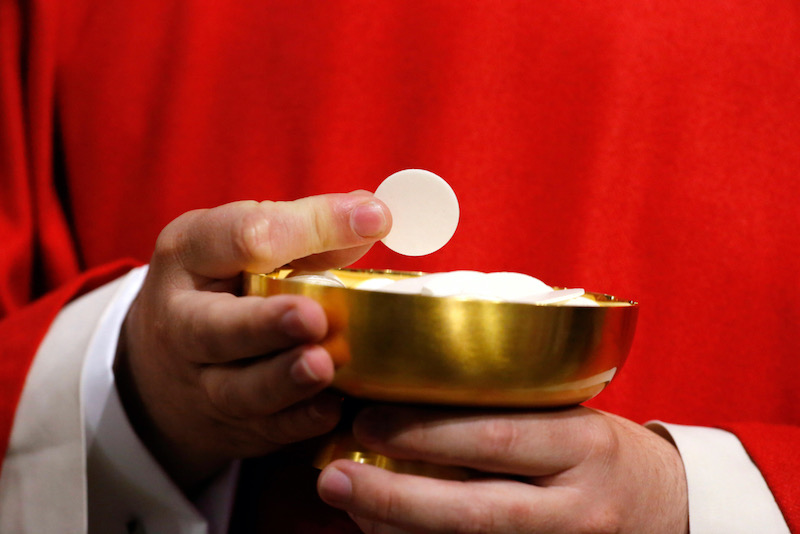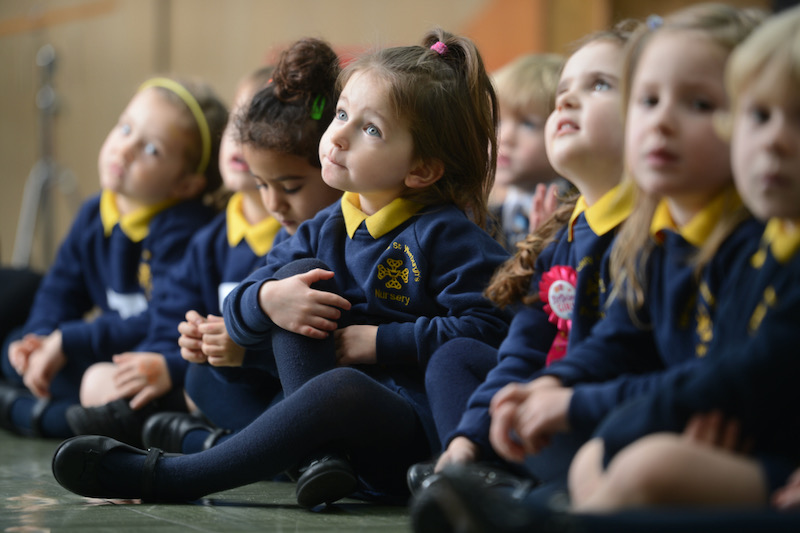The story of David and Goliath is one that now fully transcends the Judaeo-Christian traditions and has become etched within the common parlance of most people. Commentators, both political and sporting, love to tell tales of David v Goliath; stories of the underdog beating the mighty in the most unlikely and surprising way. But the story, as the author Malcolm Gladwell writes, is so often misinterpreted in favour of a romanticised defeat of Goliath against the odds, rather than the skill, intelligence and strategy of David.
At present, Catholic state education in England is at a critical impasse. Over the past ten years we have seen the decimation of local authorities as the guardians of schools and the rise and rise of academy trusts. This shift has also seen a change in the way schools are marketed. More than ever, schools have become consumer-like commodities selling their wares and tapping into the needs, desires and also insecurities of parents seeking the best school for their child.
This marketisation has had a huge impact on Catholic schools. Gone are the days of tribal Catholicism, whereby a Catholic child would automatically go to the local Catholic primary school and following that would make the automatic rite of passage into Catholic secondary education. There is now more choice, more data available, more marketing hyperbole for parents to wrestle with and in turn, they can be far more discerning about the choice they make for their child.
Figures from Lighthouse School Analysis, which pulls together national data on roll numbers, achievement, geographical context, workforce and finances, suggest that Catholic education is in a position of impending turmoil. School finances are crudely determined by the number of students who are on-roll at the beginning of October, when school census returns are made to the Department for Education. Small changes for any school in pupil roll has either a really positive or negative effect: in parts of London, schools receive close to £9000 per pupil. Therefore, monitoring shifts and trends in pupil population is crucial to understanding the overall picture of Catholic education across England.
Of the 20 dioceses in England and Wales, 18 are currently below the net capacity of pupils for their schools. If we look closely at the proportions of students aged six, beginning their journey within Catholic education, there are five dioceses that have seen a downward shift as a whole since 2016. These are Lancaster, Plymouth, Shrewsbury, Cardiff and Liverpool. This is particularly concerning given that the general population is increasing in size.
These are obviously top-level statistics, but individual schools within other dioceses are suffering and struggling to make ends-meet, with difficult conversations taking place, regarding viability, leading to unrest and concern within our system. Since 2016, the headcount of pupils within Roman Catholic schools has increased by 13 per cent which on the surface sounds positive. However, if we set against the backdrop that schools of no religious character have grown by 30 per cent, Church of England schools by 23 per cent, Jewish schools by 20 per cent and schools of other Christian faiths by 15 per cent, it paints a picture that Catholic schools are being left behind. In many ways, other entities within the state education system have become or consolidated their positions as Goliaths.
The battle-cry recently has been to state quite vacuously that all schools, including Catholic schools, “must” academise en-masse, and if they do, this will be the great panacea. It is a dangerous trap to fall into and does not solve the problem that there are frankly, not enough children currently in Catholic schools or choosing Catholic education.
Arguments are made around costs savings and economies of scale, but as national data has shown (through Lighthouse and other platforms) these pale into meagre insignificance if you have fewer children coming into your schools. In addition, arguments around economies of scale are short-lived and futile if the numbers of children entering our schools is diminishing.
It is this kind of thinking that is akin to David deciding, as a smaller man, to don some heavy armour and battle Goliath on his own terms. He would have been slain in seconds, attempting to fight a warrior who had been brought into the world and trained to fight within the Philistines' infantry. It is therefore necessary, given the circumstances, to approach this problem in a different manner. I am not saying that Catholic schools shouldn't academise, of course not, it is an exciting next step for our sector. However, it is a non-sequitur to suggest that by academising, we will automatically solve the problems we are facing with regard to pupil numbers.
At present, the “academies ship” has, like the Philistines, sailed the deep waters and entered Israel and set up camp just above the valley of Elah, with Goliath ready to battle. There are multiple national and local academy trusts in place that have gained strength over the past ten years and developed a narrative that has enticed families into their schools. Catholic education is cornered, outnumbered and needs a different strategy and an improved focus to not just academise, but also grow in strength.
Therefore, we need to learn the lessons that David taught not only King Saul on that day, but also the rest of the outnumbered Israelites and crucially the Philistines themselves. It is the lesson of someone who knew that to defeat and overcome such a great issue, requires not only a different way of thinking, but a different way of doing.
David’s victory wasn't one of pure happenstance, he orchestrated the whole affair. He approached King Saul and said: "Any time a lion or a bear carries off a lamb, I go after it, attack it, and rescue the lamb. And if the lion or bear turns on me, I grab it by the throat and beat it to death. I have killed lions and bears.” He demonstrated to King Saul his skills on the ground as a “slinger”, but knew that a very different approach was needed in order to beat the Philistines. David is not equal in size to Goliath, but he is nevertheless, highly skilled and intelligent, he brings only fives stones into battle. He removes one stone from his bag and kills Goliath with his very first slingshot. Goliath has no time to respond or defend, he is simply out-strategised.
Throughout ancient history, one-on-one battles such as these were commonplace in order to spare thousands of lives from brutal death. They were usually fought by sending down the strongest of the heavy infantry to duel one-on-one rather than the archers or in this case the “slingers” to do the fighting. The lesson to be learned from David is that he changed the narrative of the battle; he wrong-stepped the Philistines and a big cumbersome, armour-laden Goliath had no response. David is so often perceived to be an underdog, but that does a significant injustice to the skill and intelligence that he demonstrated during that battle.
Within my own context, as a headteacher, I inherited a school that had been a “problem” for both the diocese and the local authority for the best part of 25 years. The strategy to transform the school was to change the narrative. On the surface level we became co-educational, but the strategic thinking ran far deeper than that. It was about re-marketing and branding the school with a new identity, changing the narrative amongst the local parents and the Headteachers of neighbouring primary schools. We looked at admissions data and worked out where the potential reservoirs of students were – it was meticulously thought out and planned. If it had just been merely about becoming co-educational, I am waiting for someone to explain to me why the total numbers of girls applying to the school went from 90 to 280 in the space of two years, at a time when overall numbers in local primary schools are dwindling. New schools aside, my school is presently the fastest growing school in London.
Similarly, within Catholic education on a broader level, we need a strategy that is deeper than mutterings of academisation that will see schools grouped together merely by geographical locations or 'put-in' with the local bigger school. These are superficial sticking-plasters that will only entice Governing Bodies into forming trusts without dissecting what the longer term benefit to their schools and communities will be. Both the Archdiocese of Birmingham and the Diocese of Hexham and Newcastle have been impressive and incredibly organised in their approach to academisation. However, despite making recent gains, they too are both facing deficits in their pupil numbers in relation to school capacity.
The biggest trap we can fall into is allowing the Goliaths of Catholic education to assume that they have the answer to solving the intake challenges currently facing our schools and the consequential problems. As Gladwell notes in his book, multiple scientists have put forward the principle that Goliath, given his sheer size, could have suffered from acromegaly, a benign tumour affecting the pituitary gland. In short, Goliath couldn't see properly. He couldn't see clearly that the narrative had changed and that his ability to combat needed to alter. He had no chance against the speedy, ferocious, slinging onslaught that David sent his way. If we rely solely on a Goliath approach to solving the problem we are faced with, we will just attempt to match measure for measure in a battle that is currently stacked against us. We will not necessarily use the best leaders we have in reversing some of the effects of the declining numbers in our schools – some of those who have had to be more like David the shepherd. Some of our Goliaths are not necessarily equipped to solve these problems if they are ones that they either have never encountered or had to face such challenges in the past. It would be like Goliath attempting to match David in a “slinging” match.
The next few years are critical for Catholic education in England and Wales and the Catholic Education Service, are presently working hard on this issue. As Voltaire famously wrote: “God is not on the side of the big battalions, but on the side of those who shoot best.” For so long we have occupied a position of educational strength within this country, much like an Old Testament King leading a large battalion. But, it is time to become shepherds again. Just like David.



 Loading ...
Loading ...
What do you think?
You can post as a subscriber user ...
User comments (0)